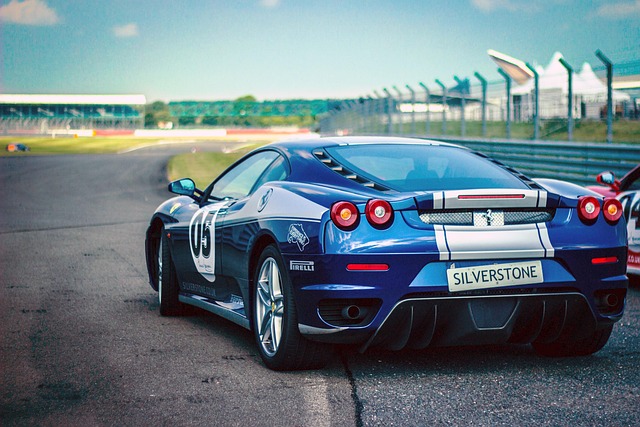Select Engine Tuning is a strategic process enhancing race car performance by optimizing fuel injection, ignition timing, and camshaft profiles. This fine-tuning increases horsepower, improves throttle response, enhances cornering, and boosts overall efficiency while prioritizing reliability in intense racing sessions. Safety considerations are vital during these modifications to prevent failures under heightened stress conditions.
In the high-octane world of race-ready cars, aggressive tuning is essential for maximizing performance. This comprehensive guide delves into the art and science behind select engine tuning, unraveling the intricacies that transform ordinary vehicles into track-dominant machines. From understanding basic engine performance to optimizing fuel injection and ignition timing, we explore strategies for extracting maximum horsepower. We also address critical safety considerations to ensure controlled and responsible tuning practices.
- Understanding Engine Performance Basics
- The Role of Select Engine Tuning
- Optimizing Fuel Injection and Ignition Timing
- Fine-Tuning for Maximum Horsepower
- Safety Considerations in Race Car Tuning
Understanding Engine Performance Basics

Understanding the basics of engine performance is a crucial step in aggressive tuning for race-ready cars. Engine tuning involves fine-tuning various components to achieve optimal power and efficiency, tailored for high-performance driving. By selecting the right tuning settings, you can enhance cornering enhancements, improve throttle response, and optimize the electric-gasoline engine balance. This precision engineering ensures your vehicle delivers peak performance on the track.
The art of engine tuning requires a deep understanding of factors like air-fuel mixture ratios, ignition timing, and camshaft profiles. Balancing these elements allows for enhanced combustion, resulting in increased horsepower and torque. With the right select engine tuning, drivers can experience smoother power delivery, improved fuel economy (surprisingly), and more consistent lap times, all while maintaining reliability for those intense racing sessions.
The Role of Select Engine Tuning

The heart of any race-ready car lies in its engine, and this is where select engine tuning plays a pivotal role. It involves fine-tuning the vehicle’s powerplant to extract the maximum performance potential, ensuring every horsepower counts on the track. This meticulous process includes calibrating fuel injection systems, optimizing ignition timing, and adjusting air-fuel ratios to achieve the perfect balance between power and efficiency. By harnessing advanced technologies and performance tuning techniques, such as supercharger engine upgrades or plug-in hybrid optimizations, engineers can transform a stock engine into a racing powerhouse.
A well-executed select engine tuning strategy not only increases horsepower and torque but also improves throttle response and overall drivability. It enhances the car’s ability to navigate through corners swiftly, ensuring a seamless transition from acceleration to braking. Moreover, a performance suspension setup, tailored alongside the engine tuning, further complements the vehicle’s handling characteristics, allowing it to grip the road tightly during high-speed races. This synergy between precise engine management and fine-tuned mechanical components is what sets race-ready cars apart, providing them with an edge on the competition.
Optimizing Fuel Injection and Ignition Timing

Optimizing Fuel Injection and Ignition Timing is a critical step in aggressive tuning for race-ready cars. By meticulously adjusting fuel injection parameters, such as fuel pressure, injection duration, and fuel-air ratio, engineers can fine-tune vehicle performance to achieve maximum power output and efficiency. This process involves precise calculations based on the engine’s specifications and desired operating conditions, ensuring a seamless blend of fuel and air for optimal combustion.
Select Engine Tuning plays a pivotal role in unlocking the full potential of a track-ready car configurations. Advanced tuning techniques, including timely ignition timing adjustments, enable outboard motor optimizations. This synchronization enhances the engine’s ability to deliver consistent torque and horsepower, making the vehicle more responsive and faster on the track. With these fine-tuned settings, drivers can experience improved cornering, increased straight-line speed, and a smoother overall driving experience.
Fine-Tuning for Maximum Horsepower

In the pursuit of maximizing horsepower for race-ready cars, fine-tuning is an art that requires precision and expertise. Select Engine Tuning involves a meticulous process where each component is carefully considered and adjusted to unlock the engine’s full potential. By optimizing spark timing, air-fuel mixture, and compression ratios, tuners can achieve a harmonious balance between power and efficiency. This intricate dance of adjustments ensures the engine breathes effectively, extracting maximum energy from every cylinder.
Engine optimization goes beyond mere numbers; it’s about finding the sweet spot where performance meets reliability. Green tech motorization, in its essence, focuses on restoring classic car engines with modern techniques while preserving their vintage character. Achieving an electric-gasoline engine balance is crucial, allowing for both environmental friendliness and exceptional racing capabilities. Every tweak is a step towards revolutionizing the track, ensuring these machines not only compete but also leave a lasting impact in the world of motorsports.
Safety Considerations in Race Car Tuning

When aggressive tuning race-ready cars, safety should never be an afterthought. This is especially true when considering select engine tuning for maximum performance. While enhancing power and acceleration through adjustments like porting and timing can significantly improve a car’s race capabilities, these modifications also increase stress on various components. For instance, higher engine RPMs and increased turbo pressures require robust materials to prevent catastrophic failure during intense cornering enhancements.
Moreover, with the growing popularity of green tech motorization, including CNG vehicle tuning, restorers and tuners must balance environmental considerations alongside performance upgrades. Restoring classic car engines for competitive racing involves a delicate interplay between leveraging advanced technology for power gains while adhering to safety standards to mitigate risks associated with high-performance driving.
Aggressive tuning is an art for race-ready cars, requiring a deep understanding of engine performance. By optimizing fuel injection, ignition timing, and fine-tuning components, enthusiasts can unlock significant horsepower potential. However, it’s crucial to balance these enhancements with safety considerations, especially in competitive environments, ensuring that the power gained is met with corresponding control and reliability. With select engine tuning as a cornerstone, car owners can navigate this complex landscape, enhancing their driving experience while navigating the high-performance realm responsibly.
